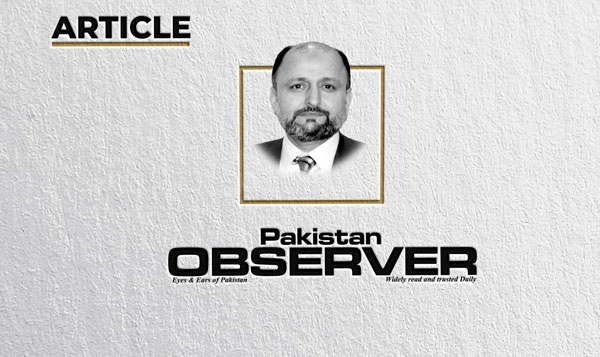Faith-aligned finance
HUMAN progress usually remains a source of satisfaction and inspiration when we look at the comfort and convenience we have achieved during these centuries.
Our systems have evolved to prompt delivery of innumerable services to maintain daily life. Going digital helped us save several resources including huge amount of time to utilize this precious resource for other productive undertakings.
However, some fundamental approaches to manage financial resources which occupy central place in human instinct couldn’t manage escape from the clutches of self-interest and exploitation.
In its current incarnation, a financial industry tempered by the “greed is good” era is scrambling to accommodate new generations of investors who place a high premium on environmental and social goals.
According to the equity funds tracked by Informa Financial Intelligence, the ESG (environmental, social and governance) subset or socially responsible investment (SRI) attracted over $35 billion in 2019.
Investors and fund managers must tackle individual challenges posed by this emerging trend.
Each investor places varying emphasis on separate parts of the ESG trifecta. Investors’ criteria vary, both in terms of duration and the degrees of return, in which each they are willing to forgo to achieve ESG goals.
Financial professionals are struggling to find credible tools and benchmarks to construct, test and maintain ESG-friendly portfolios with enough flexibility to meet the diverse goals of the investor pool and fiduciary responsibility.
Making an impact involves stopping ignoring our world’s problems and making even a small contribution towards a better future.
It means to do our part in supporting initiatives which offer solutions to pressing problems such as famine, water scarcity and poverty to name a few.
It is to join the movement of like-minded, compassionate people who realize that they have to act now, together, to have a better future tomorrow.
Julie Taylor argues, “All people experience difficulties of one type or another. Some people have financial burdens and others deal with family problems.
There are three durations of stress: life events, chronic strains, and daily hassles and uplifts.
Life events include the birth of a child, divorce and death; anything requiring adaptation during a short period of time.
Chronic strains, such as illness and injury, occur over a long period of time. Daily hassles and uplifts are the common everyday stressors of life, including studying and family.
No matter what gender, racial, or economic background a person is born into, there will always be stressors in life.
How people handle stressors is significant. What people turn to in times of trouble is relevant. Similar to procrastination, some people strive under pressure and some cannot handle the heat.
Likewise, with life’s difficulties, some people turn to methods of coping like smoking or drinking.
Others seem to strive in the midst of trouble. Something seems to separate the two responses. That is one’s faith which helps them through the stressors of life.
It allows them to see a different perspective and continue to have faith in something greater than they are.”
A recently published Oxford Faith-Aligned Impact Finance Report identified significant opportunities for faith-aligned capital to create an impact in climate-focused investing, and ESG/SRI initiatives.
The faith-aligned finance and impact investing mapped 360 separate organizations connected to Abrahamic, Dharmic and other religions.
Total net assets mapped are valued at approximately US $5 trillion. The breakdown by religion is as follows: Christian aligned capital ($260 billion), Islamic sovereign capital ($3 trillion) and Islamic private finance capital ($1 trillion), Dharmic capital ($300 billion) and Jewish capital ($16 billion).
According to the report, “Only 3% is specifically attributed to impact creation, or socially responsible investing, or ESG.
For Christian funds, this number is 1% while for Islamic funds it is 3.22%.Impact investing represents between 0.6% and 2% of global assets under management, suggesting perhaps that Islamic finance may be ahead of the global average.
Initial interviews aimed at understanding why more faith-aligned capital was not being used to create impact found that there is likely a significant number of investment decision-makers in the faith world that also prioritize return and do not necessarily accept that faith-aligned capital should be treated any differently than other capital when it comes to investments.
In other cases, there appear to be religious objections to generating a return when the intention is to create impact.”
Impact investment has been defined as: Investments made with the intention to generate positive and measurable social &environmental impact alongside a financial return.
Impact investments can be made in both emerging and developed markets and target a range of returns from below market to market rate, depending on investors’ strategic goals.
Report further suggests: millennials, 45% of whom consider social responsibility a factor in investment decision-making and also state a desire to invest their funds to help others, will over the next 10 years be benefitting from trillions of dollars.
Moreover, 90% of women investors believe in making a positive impact on society. An exciting spectrum for sustainable investment aligned with SDGs has been delineated while identifying three categories including ‘impact only’, ‘impact first’ and ‘finance first’ with expected returns.
Impact only is about grants and philanthropy, however, surprisingly the market size for ‘impact first’ has been showed in billions of dollars with expected returns up to 11%.
In the category of ‘finance first’ sustainable investment spectrum has the potential of trillions of dollars with expected returns as high as 18%.
Report concludes that a greater movement of capital toward impact creation is about to take place, with faith-aligned actors potentially leading the way.
—The writer is Associate Professor Management Sciences, Head, Centre of Islamic Finance, COMSATS University (CUI) Lahore Campus.









